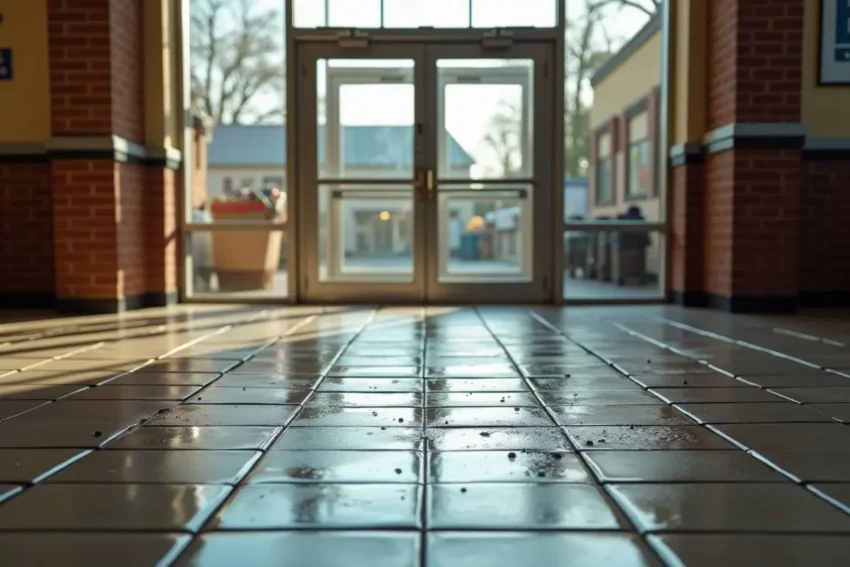Picture walking into a grocery store on a rainy afternoon, only to find puddles forming near the entrance. That tracked-in moisture may seem harmless, but it can quickly turn into a serious hazard for unsuspecting shoppers.
The Law Offices of John Phebus frequently sees cases where a simple trip to the store ends in painful injuries due to slippery conditions. When stores fail to address wet floors, customers are left vulnerable to accidents that could have been prevented. Understanding how the weather affects store entrances can help you stay safe and be aware of your rights if you are ever injured.
Why Grocery Store Entrances Become Slippery
Rain, snow, or even morning dew can easily get tracked into a grocery store as shoppers come and go. Once that moisture lands on smooth floors, it creates a slick surface that makes slipping much more likely. Add in steady foot traffic, and the entrance quickly becomes one of the most dangerous spots in the store.
Common Injuries from Slips and Falls
Slipping and falling at a grocery store may seem minor at first, but the injuries can be severe and have long-lasting effects. Here are some of the most common injuries people experience:
Sprains and Strains
Twisting or landing awkwardly can cause sprains in the wrists, ankles, or knees. These injuries may take weeks or even months to heal and can limit your daily activities. Strains in the back or shoulders are also common, especially if you try to break your fall with your arms.
Fractures and Broken Bones
Slipping on a wet floor can result in fractures to the wrist, arm, hip, or leg. Recovery often requires medical treatment, sometimes surgery, and extended time off work. Older adults are especially vulnerable, and even a minor fall can lead to serious complications like hip fractures.
Head and Concussion Injuries
Falling and hitting your head on the floor or a fixture can cause concussions or more severe traumatic brain injuries. Symptoms might not appear immediately, making medical attention essential. Even mild concussions can lead to dizziness, headaches, and difficulty concentrating for weeks after the accident.
Back and Spinal Injuries
The force of a fall can injure the spine or lower back, leading to chronic pain or mobility issues. These injuries often require ongoing treatment, physical therapy, or, in some cases, surgery. Back injuries from slips and falls can affect every part of daily life, from walking to sitting or lifting objects.
The Role of Store Owners in Preventing Accidents
Grocery store owners have a responsibility to ensure the safety of their entrances for every shopper. Simple measures, such as placing mats, posting “wet floor” signs, and regularly drying the floors, can prevent many accidents. When stores fail to take these precautions, they may be held legally responsible for any injuries that occur.
What To Do If You Are Hurt in a Slip and Fall
Being hurt in a slip and fall can be stressful, but taking the proper steps afterward can protect your health and your legal rights. Here’s what you should do if it happens:
Seek Medical Attention Immediately
Your health should always come first, even if the injury seems minor. Some injuries, like concussions or internal damage, might not be apparent right away. Getting a prompt medical evaluation ensures proper treatment and creates a record of your injuries.
Report the Accident to Store Management
Inform a store employee or manager about what happened before leaving the premises. This helps document the incident and shows that the store was aware of the hazardous condition. Request a copy of the incident report or obtain the contact information of the person who recorded it.
Document the Scene
Take clear photos of the wet floor, puddles, mats, or any other hazards that contributed to the fall. Note the time, weather conditions, and the number of people walking through the area to help show the circumstances.
Gather Witness Information
If anyone saw the fall, please ask them politely for their name and contact information. Witness statements can be critical if you decide to pursue a claim later.
Contact a Personal Injury Lawyer
A lawyer can explain your rights and guide you through the process of filing a claim or negotiating with insurance. They help ensure you are compensated for medical bills, lost wages, and any lasting effects of the injury.
How a Personal Injury Lawyer Can Help
Having a personal injury lawyer on your side can make a big difference after a slip and fall accident. They handle the legal details, allowing you to focus on recovery while ensuring your rights are protected.
Investigate the Incident
A lawyer will gather evidence, including photos, incident reports, and witness statements, to build a strong case. They can also work with experts to show how the store’s negligence contributed to your injuries.
Communicate with Insurance Companies
Insurance adjusters often try to settle quickly for the lowest amount possible, which may not cover all your expenses. A lawyer negotiates on your behalf to secure fair compensation for medical bills, lost wages, and pain and suffering.
Handle Legal Paperwork
Filing claims and meeting legal deadlines can be confusing and stressful without professional help. Your lawyer ensures all forms are completed correctly and submitted on time to protect your case.
Provide Guidance and Support
Beyond legal help, a lawyer can explain your rights and options in plain, understandable terms. They give you peace of mind by managing the process and advising you on the best steps to take.
Conclusion
Slips and falls at grocery store entrances can happen to anyone, but taking the proper precautions and knowing your rights makes a big difference. If you are ever injured, documenting the accident and seeking help promptly is key. The Law Offices of John Phebus can guide you through the process, protect your rights, and help ensure you receive the compensation you deserve.

